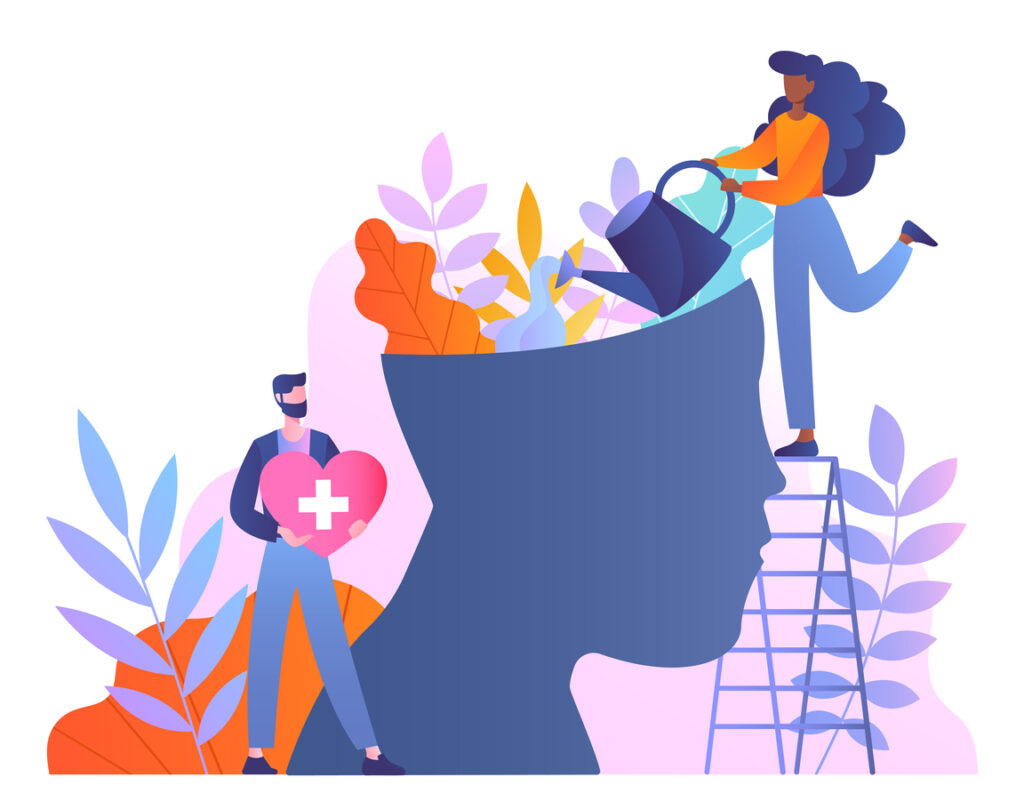Editor’s Note: Today’s post is by Sharnie Dunstall. Sharnie is an advocate for spreading positivity and embracing life’s challenges. She works as the Inclusivity and Operations Manager at The International Bunch, is an active member of C4DISC,
In a world where labels seem to define everything, from our clothing preferences to disabilities to the choices we make, mental health is one of many aspects of our lives that shouldn’t fall victim to categorization. It’s time to change the stigma that mental health can be neatly packaged and labelled. It can’t, it shouldn’t.
Mental health isn’t just anxiety, depression, OCD, ADHD, schizophrenia, bipolar, and many more conditions; it could just simply be a bad day, a challenging time, isolation; or it could be related to illness, finances, gender, and many more reasons. Often it’s a combination of these or other factors. Mental health is all around us and affects everyone. Instead of focusing on labeling it, we should strive for understanding, compassion, and support for every individual’s unique mental well-being journey. Everyone deserves access to support and guidance.
Mental health is not a one-size-fits-all approach. It’s as diverse and complex as the individuals who experience it. Attempting to label mental health struggles oversimplifies them and can lead to stigma and discrimination. Labels like depressed, anxious, or bipolar can carry heavy baggage and often lead to defining individuals by their conditions rather than acknowledging their humanity.
Furthermore, labelling mental health can also create barriers to seeking help. Many individuals may fear being judged or misunderstood if they’re labeled with a mental health condition. This fear can prevent them from reaching out for support when they need it most. Instead of focusing on labels, we should foster environments where individuals feel safe to talk openly about their mental health without fear of judgment.
Mental health awareness isn’t just a cause I advocate for; it’s a lifeline. It’s a flicker of hope that guides me through the darkest corners of my mind, where the darkness of trauma and insecurities lie. Mental health is not just a trending topic for me, it’s deeply personal.
From the moment I was born, my life was marked by surgeries and hard times. Each procedure left its mark, not just on my face but also on my mental health. Living with a cleft lip and palate has been a journey marked not just by countless surgeries, procedures, and constant infections, but also by relentless bullying, exclusion, and the invisible battle to find self-acceptance. It was as if society had a script for how I should look, and I didn’t fit the mold. Every day is a battle to face the world with courage, to confront the stares and whispers, and to silence the inner voice that echoes the cruel words of others.
Every day, I wake up and face a battle on two fronts. There’s the battle against the demons that haunt me in the mirror, the relentless voice that whispers words of doubt and self-loathing. But there’s also the battle against the demons that lurk in the back of my mind, the ghosts of trauma and anxiety that threaten to consume me.
Yet, amongst the darkness, there’s a spark of hope, a glimmer of light that refuses to be put out it’s the realization that mental health struggles aren’t a sign of weakness but a sign of resilience, and the understanding that healing begins with acknowledging the pain and having the courage to reach out for help.
For years, I carried the weight of these battles in silence, afraid to speak up for fear of judgment or misunderstanding. But the truth is, mental health doesn’t discriminate. It doesn’t care about the shape of your smile or the scars on your face. It affects us all, regardless of who we are, what we look like, where we come from, and whether we are seen as “normal”.
Navigating these battles isn’t easy. The journey is filled with setbacks, struggles, and moments of despair, as well as moments of success. But through it all, I’ve learned the importance of vulnerability, the power of owning our struggles, and sharing our stories with others. There’s a kind of loneliness that comes with feeling like you don’t belong in your own skin. It’s like living in a world where everyone else speaks a language you can’t understand, where acceptance feels like a distant dream.
For me, every day is a battle against the demons. But with each sunrise comes a renewed sense of strength, a reminder that I am more than just my scars. While the journey towards self-acceptance may never end, it’s a journey worth taking. Every day I put on my suit of armor, and some days it is unbelievably strong and some days it’s not, but that is okay — I know that it is okay to not be okay.
It’s in our vulnerability that we find strength, the strength to break free from the shame and stigma, and the strength to reach out for help when we need it most. It’s in our vulnerability that we find connection, the connection that reminds us we’re not alone in our struggles.
Since stepping into my role as the Inclusivity and Operations Manager at The International Bunch, I’ve been focused on ensuring that our team feels supported, especially when it comes to their mental health and overall well-being. I became a certified Mental Health First Aider to provide initial support to any of our team experiencing a mental health crisis, or developing a mental health problem, or just having a bad day. I offer a listening ear, empathy, and guidance on how to access further support and resources.
Being a Mental Health First Aider isn’t just about getting the right training, it’s about creating a culture of understanding and kindness throughout our organization. It’s about recognizing that everyone’s mental health journey is totally unique and valid.
Working in the research ecosystem has opened up opportunities I didn’t realize were available. I joined The International Bunch as PA to Lou Peck (The International Bunch CEO) at the beginning of 2023, but my responsibilities grew, and I started being able to follow my passion, supporting the team more with important initiatives. My role morphed into Inclusivity and Operations in recognition of all the diversity, equity, inclusion, and accessibility (DEIA) related work I was doing. Lou connected me with Simon Holt (Senior Product Manager for Content Accessibility at Elsevier) to help me better understand how I can get more involved in DEIA work in the industry. Simon has been amazing and really helped solidify in my mind how best to focus this time. I’m an active member of C4DISC, and am now taking on the role of co-chair for the new ALPSP EDI special interest group (SIG), formerly their DEIA/EDIA Working Group co-chaired by Heather Staines and Margherita Zorzetto who did an amazing job. It is now transitioning to a SIG.
If you want to get more involved in our industry’s initiatives, get in touch with any of these groups; they are super helpful and will give guidance and advice.
Here are some tips I have learned along the way to help you support mental health in your own workplace:
- Continuous learning — dedicate time to educating yourself about various mental health conditions, their symptoms, and their impacts on individuals. Remember it’s not one-size-fits-all and the learning will never stop.
- Listen — sometimes, all someone needs is a friendly ear. Practice active listening when team members express their thoughts and feelings. Provide your full attention, validate their emotions, and offer support without judgment.
- Talk — encourage open discussions about mental health in both formal and informal settings. Create a safe space where team members feel comfortable sharing their experiences and seeking support without fear of stigma.
- Self-care — advocate for healthy coping strategies and self-care practices among your colleagues. Encourage individuals to prioritize their mental well-being and provide resources to support their efforts.
- Know when to refer — while mental health first aiders play a crucial role in providing initial support, it’s essential to recognize when professional intervention is necessary. Encourage team members to seek assistance from qualified mental health professionals when needed.
Big or small, there are lots of ways you can support your teams. We’re a small team of seven; here’s how we’re supporting mental health:
We’re a remote first business. Among the initiatives we have implemented is an in-house virtual counselor, helping team members access support anonymously as needed. Mireia from So We Are Counselling is someone that Lou mentored a few years ago through Business Wales and really saw the value of virtual counseling for the team, even before the pandemic. We secure two hours per month; if the team uses more hours, we pay the difference. The team reaches out to Mireia directly; they don’t need to inform us, and Mireia doesn’t tell us who she has spoken with – just how many sessions have been used. This approach has worked really well, with the team feeling more supported.
We’ve also started offering private health insurance with Vitality and we’ve just signed up with Croner for our HR and health and safety needs to ensure we are supporting our team members more. We also offer the team free access to health-related apps like HeadSpace. As a remote-first business, it can be harder to connect and reach each other, so we have a daily 15-minute check-in to see how we all are and whether anyone has anything they are stuck with. We also have regular meetings like British Sign Language (BSL) training and team meet-ups. At least once a year, we all meet up in person, and Lou and I also meet people individually face to face throughout the year.
While these efforts are commendable, they don’t always achieve the expected results. It’s equally important to acknowledge instances where certain initiatives didn’t meet the expected results. Trial and error is part of the process, and what works for some may not work for others due to factors like organizational size, willingness, understanding, and diversity. Not everything you try will be accommodating for all.
For instance, the weekly “Brew and a biscuit” sessions we experimented with where the team could join and talk about anything other than work, didn’t gain traction, possibly due to scheduling conflicts and levels of availability. Similarly, not everyone is able to participate in BSL training due to workload, which highlights the need for flexibility in accommodating diverse needs and preferences.
By embracing a culture of understanding and support, we can create a workplace where mental health is not defined by labels but by compassion and empathy.
Let’s work together to break down barriers, destigmatize mental health, and support each other on our journeys toward mental well-being.
To anyone out there battling their own demons, know that you’re not alone. Your story matters, and your voice deserves to be heard. Together, let’s break the silence and shine a light on the importance of mental health awareness. After all, it’s in our collective voices that we find strength, courage, and hope.
Mental health awareness isn’t just about raising awareness it’s about breaking the silence. It’s about creating a safe space where people can share their stories without fear of judgment or stigma. Because in the end, it’s our stories that connect us, that remind us that we’re not alone in our struggles.
Discussion
9 Thoughts on "Mental Health Awareness Mondays — Building a Supportive Workplace: Reflections on Mental Health Initiatives and Adaptation"
Thanks so much Sharnie for sharing your journey and experiences – you are an inspiration to us all!
The last sentence really encompasses a lot of what SSP’s Mental Health Task Force is trying to facilitate too – “Mental health awareness isn’t just about raising awareness it’s about breaking the silence. It’s about creating a safe space where people can share their stories without fear of judgment or stigma. Because in the end, it’s our stories that connect us, that remind us that we’re not alone in our struggles.”
Hi Adrian,
I’m glad to have the opportunity to share my journey and experiences with you all. Your kind words mean a lot to me, and I’m grateful for your support.
Let’s continue inspiring each other on this journey!
Sharnie, you are an inspiration to us every day and key to keeping the team together and feeling supported. Well done on such an honest piece. Thank you for everything you do.
Wow Lou, thank you so much for your kind words! It means the world to me.
You wrote a really powerful post, Sharnie. In a world where fakery has become commonplace, writing that is vulnerable and authentic becomes ever more impactful. Thank you for your contribution, and it will inspire others.
Hi Tim,
Thank you so much! I really do hope it helps to inspire others.
Sharnie, clearly you are resilient and resourceful, and a supportive colleague who makes a difference. I hope that by sharing your story to this community, you personally are feeling strengthend and supported, as you aim to help others. Congratulations on your new roll with the ALPSP SIG. There’s much to be done and that CAN be done.
Thank you so much for your kind words and support it really means a lot.
I’m excited about my new role with the ALPSP SIG and looking forward to seeing how it progresses, as you say there is a to be done, and can be done!
Thank you again for your encouragement!
Really well written and informative so much help.
So proud


